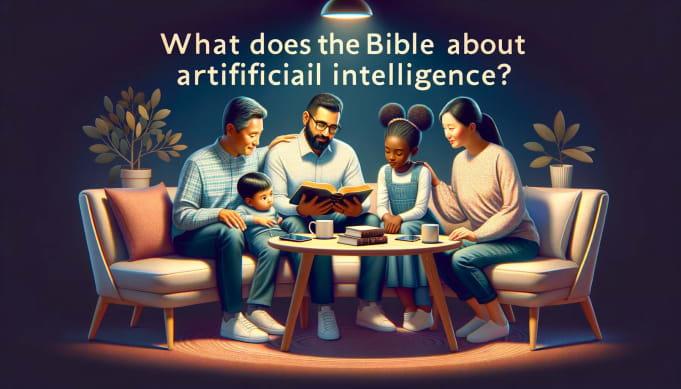Addressing Your Concerns
Navigating the intersection of faith and technology can be challenging. You may wonder how to balance embracing AI without compromising your Christian values. As a software developer who created FaithGPT—an AI-powered collection of Bible study tools—I, too, wrestled with these questions. This blog will provide scriptural guidance and practical advice, helping you utilize AI as a tool to deepen your faith.
"For the LORD gives wisdom; from his mouth come knowledge and understanding." — Proverbs 2:6 (NIV)
Transform Your Ministry with AI (Save 10+ Hours Weekly!)
Effortlessly create stunning graphics, videos & audio, reach more people with translation, and streamline tasks. Elevate your church's impact – no tech expertise needed!
Download Now1. Understanding AI Through a Biblical Lens
What is AI?
Artificial Intelligence refers to machines designed to mimic human intelligence, performing tasks such as learning, problem-solving, and even creativity. Machines like FaithGPT can analyze massive volumes of text, offering insights and interpretations that can aid in Bible study.
- Proverbs 4:7: "The beginning of wisdom is this: Get wisdom. Though it cost all you have, get understanding."
- Fact: A 2019 Gartner report showed a 270% growth in AI usage among businesses from 2015-2019.

Biblical Perspectives on Knowledge and Wisdom
The Bible has much to say about knowledge and wisdom, often urging believers to seek understanding but also to approach it with godly discernment.
- James 1:5: "If any of you lacks wisdom, you should ask God, who gives generously to all without finding fault, and it will be given to you."
- Quote: "We must be discerning when engaging with technology, ensuring it aligns with godly wisdom."
"And do not be conformed to this world, but be transformed by the renewing of your mind..." — Romans 12:2 (NKJV)
AI and Human Creativity
One might wonder if AI infringes on human creativity, a gift from God. From a biblical viewpoint, God’s creativity is infinite, and humans, created in His image, have a portion of this creativity to create and innovate.
- Ecclesiastes 7:29: "This only have I found: God created mankind upright, but they have gone in search of many schemes."
- Example: AI can complement human creativity by handling repetitive tasks, allowing humans to focus on more innovative pursuits.

2. AI in Relation to Creation
The Imago Dei and AI
One common question is whether creating AI challenges the biblical concept of humans being made in the image of God (Imago Dei). The Bible clearly states that only humans are made in God’s image, capable of relationship with Him.
- Genesis 1:27: "So God created mankind in his own image, in the image of God he created them; male and female he created them."
- Discussion: AI lacks the spiritual capacity and moral accountability instilled in humans by God.
Creation and Innovation
The Bible encourages humans to innovate and exercise stewardship over creation. Crafting AI can be seen as exercising our God-given creativity and mandate to steward creation.
- Ecclesiastes 1:13: "I applied my mind to study and to rummage through by wisdom all that is done under the heavens."
- Example: Using AI to assist in solving complex problems like surroundings change and healthcare.

The Partnership of Human and AI
Instead of viewing AI as a replacement, we should see it as a partnership where AI assists humans to achieve more.
- Example: Farmers using AI for precision agriculture to grow more food with fewer resources.
- Quote: "AI can help us achieve God’s mandate to steward the earth more effectively."
"The earth is the LORD's, and everything in it, the world, and all who live in it." — Psalm 24:1 (NIV)
AI's Role in Understanding Creation
AI and the Image of God (Study Guide)
Packed with Bible verses and thought-provoking questions, this study guide explores AI's effect on areas like creativity, morality, work, privacy, and the church itself.
Download NowAI can help us understand God’s creation better. For instance, AI-driven simulations can predict weather patterns more accurately, aiding in disaster preparedness.
- Job 12:8-9: "Or speak to the earth, and it will teach you, or let the fish in the sea inform you. Which of all these does not know that the hand of the LORD has done this?"
- List of AI Applications in Understanding Creation:
- Weather Prediction: AI models that predict hurricanes and save lives.
- Ecological Monitoring: AI helps monitor endangered species.
- Environmental Preservation: AI tools to manage natural resources sustainably.

3. AI and Ethical Considerations
The Ethics of AI in Christian Perspective
How do Christians engage ethically with AI? Ensuring that AI development aligns with moral principles is crucial. The Bible offers frameworks for making ethical decisions.
- Micah 6:8: "He has shown you, O mortal, what is good. And what does the LORD require of you? To act justly and to love mercy and to walk humbly with your God."
- Table: Ethical Guidelines from a Christian Perspective | Principle | Biblical Basis | AI Application | |----------------------------|---------------------------------------------------|-------------------------------------| | Dignity of Life | Genesis 1:27 | Avoiding bias, ensuring fairness | | Stewardship | Genesis 2:15 | Responsible use of AI in resources | | Truth and Transparency | Ephesians 4:25 | Clarity in AI algorithms and data | | Justice and Equity | Isaiah 1:17 | Addressing disparities in AI usage |
Addressing Bias in AI
Bias in AI systems is a significant ethical concern. As Christians, we should strive to create fair and unbiased AI.
- Proverbs 11:1: "The LORD detests dishonest scales, but accurate weights find favor with him."
- Example: Implementing diverse training data sets to ensure AI fairness.
Ensuring AI Transparency
Transparency in AI is crucial to maintain trust. Algorithms should be understandable and explainable.
- Acts 24:16: "So I strive always to keep my conscience clear before God and man."
- Quote: "Transparency in AI aligns with biblical principles of truth and honesty."
"Do not lie to each other, since you have taken off your old self with its practices." — Colossians 3:9 (NIV)

AI in Surveillance and Privacy
Balancing the benefits of AI in public safety with the privacy rights of individuals is ethically complex. Christians should advocate for responsible use.
- Matthew 10:16: "Behold, I send you out as sheep in the midst of wolves, so be wise as serpents and innocent as doves."
- Fact: The European Union’s GDPR sets a global standard for data privacy, influencing AI development worldwide.
The Dangers of AI
While AI can bring benefits, caution is needed to avoid potential pitfalls. Misuse can lead to dehumanization and ethical breaches.
- Proverbs 14:5: "A truthful witness saves lives, but a false witness is deceitful."
- Quote: "The misuse of AI can lead to ethical and moral disasters if not carefully managed."
"The integrity of the upright guides them, but the unfaithful are destroyed by their duplicity." — Proverbs 11:3 (NIV)
AI and the Image of God (Study Guide)
Packed with Bible verses and thought-provoking questions, this study guide explores AI's effect on areas like creativity, morality, work, privacy, and the church itself.
Download Now4. Practical Applications of AI in Bible Study
Enhancing Bible Study with AI
AI tools like FaithGPT can significantly enhance Bible study by providing contextual insights, linguistic analyses, and theological reflections.
- Example: Integrating AI-powered commentaries and cross-references.
- List:
- Contextual Understanding: AI can provide historical and cultural context for passages.
- Linguistic Analysis: Analyzing original languages to give deeper insights.
- Theological Synthesis: Aggregating various theological perspectives for a comprehensive understanding.
- Interactive Learning: AI can adapt to your pace and understanding, offering personalized learning experiences.
"I will instruct you and teach you in the way you should go; I will counsel you with my loving eye on you." — Psalm 32:8 (NIV)
AI as a Tool, Not a Replacement
It’s crucial to remember AI is a tool meant to assist, not replace pastors or community. AI should complement personal study and spiritual fellowship.
- Hebrews 10:25: "Not giving up meeting together, as some are in the habit of doing, but encouraging one another."
- Quote: "Technology should enhance our walk with Christ, not replace the meaningful relationships within the Church."
AI for Biblical Languages
Transform Your Ministry with AI (Save 10+ Hours Weekly!)
Effortlessly create stunning graphics, videos & audio, reach more people with translation, and streamline tasks. Elevate your church's impact – no tech expertise needed!
Download NowUnderstanding the original languages of the Bible is vital for deeper study.
- Example: AI tools for learning Greek and Hebrew with contextual usage.
- List of AI Language Tools:
- Lexicon Tools: AI-powered lexicons for understanding word usage and meanings.
- Grammar Check: AI can help with parsing Hebrew and Greek grammar.
- Translation Comparisons: AI can compare different Bible translations for better interpretation.

5. Scriptural Guidance on AI Use
Biblical Stewardship in AI Development
The Bible calls for responsible stewardship in all areas, including technology. Developers should aim to create AI that aligns with biblical values.
- 1 Corinthians 4:2: "Now it is required that those who have been given a trust must prove faithful."
- Tips for Developers:
- Ensure fairness and transparency in all aspects of AI development.
- Seek diverse perspectives when training AI models.
- Prioritize ethical considerations over profit.
"To whom much is given, much will be required." — Luke 12:48 (NIV)
Human-AI Interaction
Transform Your Ministry with AI (Save 10+ Hours Weekly!)
Effortlessly create stunning graphics, videos & audio, reach more people with translation, and streamline tasks. Elevate your church's impact – no tech expertise needed!
Download NowHow should Christians interact with AI? The Bible provides principles for godly interaction, emphasizing wisdom and discernment.
- Proverbs 3:21-22: "My son, do not let wisdom and understanding out of your sight, preserve sound judgment and discretion; they will be life for you, an adornment to grace your neck."
- Guidelines for Interaction:
- Use AI respectfully, acknowledging its limitations.
- Promote ethical and responsible use.
- Continually seek God’s wisdom in all technological engagements.
Balancing Technology and Faith
Balance is crucial in integrating AI into our lives. Our faith should always guide our technological use.
- Matthew 6:33: "But seek first his kingdom and his righteousness, and all these things will be given to you as well."
- Example: Dedicating time for Bible study and prayer without the distraction of technology.
Embracing Change Without Compromising Faith
Transform Your Ministry with AI (Save 10+ Hours Weekly!)
Effortlessly create stunning graphics, videos & audio, reach more people with translation, and streamline tasks. Elevate your church's impact – no tech expertise needed!
Download NowChange is inevitable with advancing technology, but our faith remains a solid foundation.
- Joshua 1:9: "Have I not commanded you? Be strong and courageous. Do not be afraid; do not be discouraged, for the LORD your God will be with you wherever you go."
- Quote: "While technology evolves, our faith and commitment to God’s principles should be unwavering."

6. AI and Spiritual Growth
Using AI to promote Spiritual Growth
AI can be a powerful tool to aid in spiritual growth if used wisely.
- Example: Daily devotion apps powered by AI that provide personalized scripture verses and reflections.
- List of AI Tools for Spiritual Growth:
- Prayer Apps: AI-powered apps for tracking and organizing prayer requests.
- Meditation Guides: AI tools offering Christian meditation guides.
- Bible Study Plans: AI-generated Bible study plans tailored to individual progress.
"But grow in the grace and knowledge of our Lord and Savior Jesus Christ. To him be glory both now and forever! Amen." — 2 Peter 3:18 (NIV)
Accountability Through AI
AI can provide accountability partners for spiritual disciplines like prayer, Bible reading, and fasting.
- Example: AI reminders for daily devotionals and scripture memorization.
- Quote: "AI can help us maintain consistency in our spiritual disciplines."
Addressing Spiritual Burnout with AI
Spiritual burnout is real, and AI can help alleviate it by offering support and guidance.
- Matthew 11:28: "Come to me, all you who are weary and burdened, and I will give you rest."
- Example: AI tools that offer personalized encouragement and scripture to uplift your spirit.

7. AI in Evangelism and Ministry
AI in Evangelism
AI tools can support evangelism efforts, reaching a broader audience.
- Example: AI chatbots answering theological questions online.
- Fact: According to a 2019 Barna report, 64% of young adults believe that online content plays a significant role in their spiritual journey.
Ministry Applications of AI
From sermon preparation to pastoral care, AI can assist in various ministry aspects.
- List of Ministry Applications:
- Sermon Prep: AI tools for researching sermon topics and scripture cross-referencing.
- Pastoral Care: AI-powered CRM for tracking and managing pastoral visits and member care.
- Discipleship Programs: AI-based systems for tracking disciple-making progress and needs.
"He said to them, 'Go into all the world and preach the gospel to all creation.'" — Mark 16:15 (NIV)
AI in Church Administration
Efficient church administration supported by AI can free up time for more ministry work.
- Example: AI tools for managing church finances and member databases.
- Quote: "Leveraging AI for administrative tasks allows leaders to focus more on ministry."

8. AI and Youth Engagement in Churches
Engaging the Younger Generation
The younger generation is often more tech-savvy and can be engaged through AI.
- Example: AI-driven interactive Bible studies for youth groups.
- Fact: A 2020 survey by Lifeway Research revealed that 75% of young adults prefer digital over traditional Bible study formats.
AI for Education in Churches
Transform Your Ministry with AI (Save 10+ Hours Weekly!)
Effortlessly create stunning graphics, videos & audio, reach more people with translation, and streamline tasks. Elevate your church's impact – no tech expertise needed!
Download NowAI can enhance educational programs within the church, making learning more engaging and effective.
- List of Educational Uses:
- Sunday School: AI-based curriculum development and customized learning paths.
- Bible Classes: Interactive AI tools for deeper engagement.
- Training Programs: AI systems for training church staff and volunteer leaders.
"Train up a child in the way he should go, and when he is old he will not depart from it." — Proverbs 22:6 (NIV)
The Role of AI in fostering Community
AI can create platforms that uplift community and encourage regular interaction among church members.
- Example: AI-powered apps that connect small groups and facilitate discussions.
- Quote: "Utilizing AI to build community aligns with biblical principles of fellowship and unity."

9. AI and Mental Health in the Christian Context
Addressing Mental Health Issues
AI can offer support for mental health issues, providing resources and guidance aligned with Christian values.
- Example: AI counselors offering scripture-based advice.
- Fact: Christian-based AI tools like SoulCare use AI to provide mental health support rooted in biblical principles.
AI in Counseling
AI can support pastoral counseling by offering resources and analytics to pastors.
- List:
- Resource Management: AI systems to organize counseling resources.
- Analytics: Tools to track counseling outcomes and progress.
- Scripture Integration: AI suggesting scripture relevant to counseling topics.
"Cast all your anxiety on him because he cares for you." — 1 Peter 5:7 (NIV)
AI for Monitoring Spiritual Health
AI can help monitor individual spiritual health, offering personalized growth plans and accountability.
- Example: AI-generated spiritual wellness reports.
- Quote: "Consistent spiritual health monitoring through AI can facilitate growth and resilience."

10. Future Directions
AI in Theological Research
AI has the potential to revolutionize theological research, offering new insights and perspectives.
- Example: AI tools that analyze historical theological texts to find connections and themes.
- Fact: AI’s ability to process large volumes of data can uncover patterns and insights not easily noticed by manual research.
AI in Global Missions
AI can support global missions by helping translate the Bible into different languages and develop culturally relevant teaching materials.
- Example: AI translation tools for unreached language groups.
- Quote: "AI can enable more effective and faster translation of the Bible, making God’s word accessible to every nation."
"Therefore go and make disciples of all nations, baptizing them in the name of the Father and of the Son and of the Holy Spirit." — Matthew 28:19 (NIV)

Final Thoughts
The integration of AI in our lives brings both opportunities and challenges. As Christians, we must navigate this with godly wisdom, ensuring our actions remain aligned with biblical principles. By leveraging AI responsibly, we can enhance our spiritual journey and deepen our understanding of God's Word.
"Commit to the LORD whatever you do, and he will establish your plans." — Proverbs 16:3 (NIV)
Let’s use

